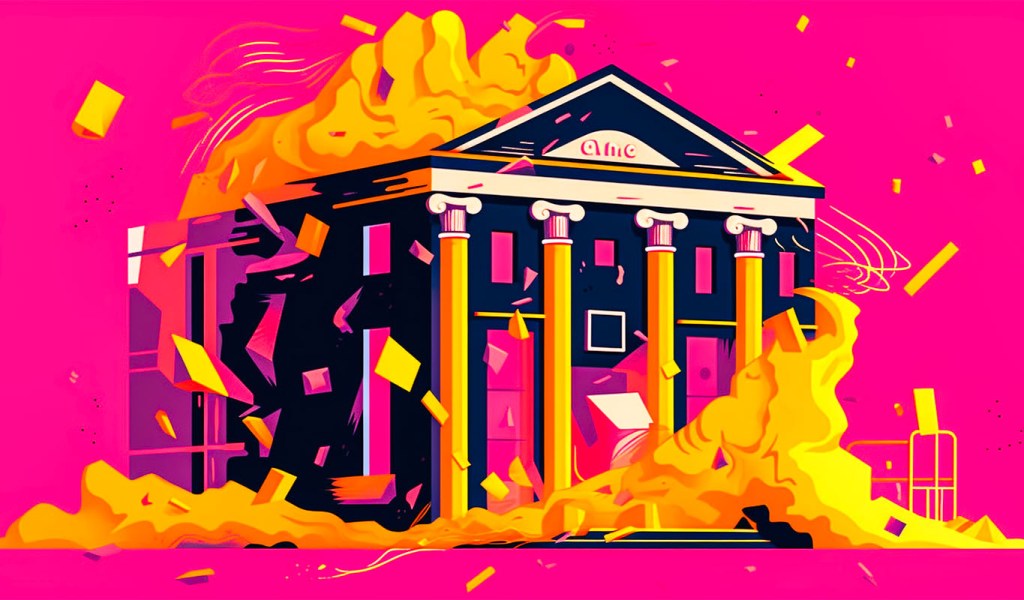
US lawmakers are issuing a warning to the Chair of the U.S. Securities and Exchange Commission (SEC), saying that he could soon hear from Congress. In a recent announcement, Republican Senator Bill Haggerty of Tennessee says that the SEC Is weaponizing itself to destroy an entire industry and tells Chair Gary Gensler to anticipate having […]
The post Senator Haggerty Tells Gary Gensler To Expect To Hear From Congress as US Officials Respond to SEC Lawsuits appeared first on The Daily Hodl.

References to the tax were removed from the U.S. debt bill, but that doesn’t mean it’s gone for good.
Bitcoin (BTC) miners in the United States can breathe a sigh of relief after a proposed tax on crypto mining did not make it into a bill to raise the U.S. debt ceiling that appears set to pass.
The Digital Assets Mining Energy (DAME) excise tax proposal sought to charge crypto miners a tax equal to 10% of the cost of the electricity they used for mining in 2024, before scaling up to 30% in 2026.
The tax was highly controversial, with critics arguing that it had the potential to increase global emissions as a result of miners being forced to go overseas where countries may produce more emissions during energy production.
Additionally, Bitcoin miners seek out cheap energy, and as one of the cheapest sources of energy is excess renewable energy, Bitcoin miners can actually incentivize its production by providing utilities with a buyer for energy that would otherwise be wasted.
The news broke after Bitcoin miner Riot Platforms vice president of research Pierre Rochard noted on May 28 that the proposed bill did not include any mention of the DAME tax, which Representative Warren Davidson replied was “one of the victories” of the bill.
Yes, one of the victories is blocking proposed taxes.
— Warren Davidson (@WarrenDavidson) May 29, 2023
While much of the online discussion around the news suggested the proposal was “dead,” others, such as Coin Metrics co-founder Nic Carter, highlighted that it was only temporarily defeated, alluding to the possibility of it being included in future bills.
Bitcoin mining "DAME" tax defeated (for now)
— nic carter (@nic__carter) May 29, 2023
Biden CEA, specifically Heather Boushey, hold this L https://t.co/hJgZ7oUGub
Carter suggested later in a May 29 Twitter thread that the administration would likely attempt to sneak it into some omnibus bill and would already have done so if it had the political currency to do so.
But bills are required to pass both through Congress and the House, and considering the Republican party is generally opposed to increases in taxes and currently controls the House, it seems unlikely such an omnibus bill would be able to make it to the president’s desk.
While speaking to Chamber of Digital Commerce founder and CEO Perianne Boring during a May 20 fireside chat at the Bitcoin 2023 conference in Miami, Senator Cynthia Lummis assured viewers that the DAME tax “isn’t going to happen.”
Lummis added that ensuring Bitcoin mining firms remain in the U.S. was important for both national security and energy security, highlighting how Bitcoin mining can both reduce gas flaring emissions and help stabilize the energy grid.
Cointelegraph contacted the White House asking whether it planned to continue pursuing the DAME tax but did not receive a response.
In response to questions from Cointelegraph, Bitcoin miner Marathon Digital Holdings CEO Fred Thiel suggested that, regardless of whether President Joe Biden’s administration decides to keep pursuing the DAME tax, it will continue its anti-crypto agenda, saying:
“I think it is clear that this administration will continue to broadly oppose the crypto sector, and even if this specific tax is no longer on the table, it is likely not the last of misguided, targeted efforts to bring this industry down.”
Many from within the crypto industry and even some U.S. lawmakers agree with this take, arguing that, among other measures, the U.S. government is making a coordinated effort to discourage banks from working with crypto firms — aka Choke Point 2.0 — under the guise of ensuring the financial system remains stable and safe.
When businesses make long-term decisions, they generally seek to reduce risk. So, given the choice of operating in a region with clear, crypto-friendly policies compared to one where regulations are unclear, and there is a greater potential for policies that hurt the competitiveness of U.S.-based activity, firms will generally choose the former.
Thiel highlighted how the actions of the U.S. government and regulators weigh in on business decisions while speaking to Cointelegraph, saying, “Regardless of the DAME tax’s likelihood of passing, Marathon has already begun diversifying the locations of our operations.”
Asia Express: Yuan stablecoin team arrested, WeChat’s new Bitcoin prices, HK crypto rules
Thiel added that “with regulation around mining being so nebulous,” his firm has made the strategic decision not to concentrate its footprint in the U.S. but rather diversify its operations.
He pointed to a May 9 announcement from his firm, which said it would be building two new mining facilities in Abu Dhabi.
Abu Dhabi is a region that has made a concerted effort to attract crypto-related investment via its clear regulatory regime, which has been hailed as pro-market.

U.S. Senator Cynthia Lummis joined Chamber of Digital Commerce CEO Perianne Boring on stage at Bitcoin Miami 2023 for a lengthy discussion on regulation.
U.S. Republican Sen. Cynthia Lummis of Wyoming held a fireside chat with the founder and CEO of Chamber of Digital Commerce Perianne Boring during the Bitcoin 2023 event in Miami on May 19.
The topics of discussion were the importance of Bitcoin to U.S. national and energy security and the upcoming legislation surrounding cryptocurrency, blockchain, and related technologies.
Lummis described regulating Bitcoin and related technologies as a national security issue. She opined that the U.S. government had been irresponsible with its debt, and positioned Bitcoin as a decentralized safety net for citizens:
“I'm actually worried as we go into another debt ceiling debate that we will eventually increase the debt ceiling to the point where our interest payments will exceed how much money we spend on national defense. So it is a national security issue.”
The senator made clear that it was her belief that the current challenges surrounding the passing of Bitcoin-friendly bills had more to do with what she perceived as ignorance or a lack of education than concerns grounded in reality.
Addressing the audience as a whole, Lummis quipped “even though you all know that when FTX failed, they held zero Bitcoin, there are a lot of people in Washington DC that conflate companies with digital assets, they conflate Bitcoin with other cryptocurrencies.”
Senator Lummis, alongside junior New York senator Kristen Gillibrand, hope a bill they’ve drafted as a comprehensive cryptocurrency legislative measure will serve as a catalyst for positive change. However, according to Lummis, the two senators are waiting to see how a bill introduced in the house relating to stable coins does before introducing their own.
Lummis appeared optimistic concerning the bill’s chances citing as a significant factor the facts that senator Gillibrand served on the senate committee overseeing the CFTC while she herself was a member of the committee with oversight of the SEC.
Perianne Boring, founder and CEO of Chamber of Digital Commerce, shifted the conversation to mining, pointing out that her company’s membership represented over 50% of the Bitcoin hashrate in the U.S. and that many of her clients were worried about the proposed 30% mining tax floated by the White House recently.
While mention of the tax solicited boos, senator Lummis turned the jeers into cheers by simply responding with “Well, I want to start by saying that isn't going to happen.” She then reiterated that several members of congress were working diligently with the digital assets community to ensure that fair regulation would ensue.
In citing the further importance of getting regulation right, Lummis again described the issue as one of national security, this time adding that it was also imperative for the environment that we harness the Bitcoin mining process:
“One of the advantages of Bitcoin mining is that when you drill an oil and gas well, and it its distance from other oil and gas wells, you vent the gas into the atmosphere until you can bring in a pipeline to hook it up. … Well, while that's being vented, you can pull a Bitcoin mining operation in a trailer, use the vented methane gas to mine your Bitcoin and you are preventing that gas from being vented into the atmosphere.”
The senator added “Bitcoin is cleaning up the environment” to further cheers from the audience. She also mentioned that Bitcoin mining can be used as a tool to stabiliize the energy grid, stating that mining operations could be increased or decreased to ensure proper energy distribution.
In explaining why the U.S. government had been reticent to push Bitcoin technologies, Lummis pointed to the perception by congress that “Bitcoin and cryptocurrencies are being used for criminal activities.”
“We've tried to educate members of Congress that companies like Chainalysis can actually solve crimes easier with Bitcoin and cryptocurrencies than they can with U.S. dollars,” explained Lummis, adding “but there are still people that just don't believe that.” She went on to explain that pushing Bitcoin and related technological innovations such as mining operations overseas would erode U.S. law enforcement’s abilities to operate in an increasingly digital world.
Magazine: Musk hints at suing Microsoft, US Rep. wants Gensler fired, and more

Bitcoin (BTC) enthusiast and US Senator Cynthia Lummis is slamming the former chairman of collapsed Signature Bank, alleging that the executive is avoiding taking responsibility for the institution’s demise. In a Senate Banking Committee hearing, the Wyoming Republican tells former Signature Bank chair, Scott Shay, that he and his colleagues may be unfairly “deflecting blame” […]
The post Signature Bank Chairman Avoiding Responsibility in $110,000,000,000 Collapse: Senator Cynthia Lummis appeared first on The Daily Hodl.

Senator Lummis noted that Signature Bank’s Scott Shay mentioned digital assets 10 times in his testimony about the bank’s collapse.
A former Signature Bank executive has been slammed for seemingly trying to place the blame for his bank’s collapse on crypto while purportedly being able to pocket millions in bonuses and stock options.
During a Senate Banking Committee hearing on May 16, United States Senator Cynthia Lummis lashed out at Scott Shay, the former chairman of the now-defunct bank, in relation to his prepared statement on what led to his bank's collapse.
In his testimony, Shay noted the bank began accepting deposits from businesses in the digital asset sector in 2018 and then “significantly” reduced its digital asset deposits in 2022 as the industry experienced volatility.
He said his bank was seized by regulators after “a bank with strong ties to the digital asset sector” fell, which then led to $16 billion being withdrawn from Signature.
“It looks like there has been a lot of deflection of blame onto those particular depositors that deal in digital assets and onto regulators, but you haven’t accepted any blame yourself,” Lummis said.
Shay, however, denied pointing the finger at digital assets during the Senate hearing.
“You use the term 10 times during your testimony,” responded Lummis.
During another part of the hearing, Senator Elizabeth Warren blasted Silicon Valley Bank (SVB) CEO Gregory Pecker and Signature Bank’s Shay for allegedly “keeping millions after recklessly crashing banks.”
“Right now, the law says that people like Mr. Becker and Mr. Shay [...] can pay themselves tens of millions of dollars in bonuses and stock options, and when the banks blow up, Mr. Becker and Mr. Shay get to keep all the money. And that is just plain wrong.”
“If we don't fix it, every CEO for these multibillion-dollar banks will keep right on loading up on risks and blowing up banks, and everybody else is going to have to pay for it.”
Warren noted that she is working within a bipartisan group in the Banking Committee to introduce a bill that can claw back “these crazy paychecks.”
Cointelegraph contacted Shay and Becker for comment but did not receive an immediate response.
Related: Signature Bank failed to understand risks associated with crypto: FDIC chair
In April, Adrienne Harris, superintendent of the New York Department of Financial Services (NYDFS) reportedly said it was “ludicrous” that one could blame crypto for Signature Banks collapse.
During a Chainalysis Links conference in New York City, she said the events leading up to the failure of Signature were instead a “new-fashioned bank run.”
The NYDFS took control of Signature Bank on March 12, claiming it was protecting the U.S. economy from “system risk.” The bank was the latest failure following the collapse of the crypto-friendly Silvergate Bank and SVB.
Hall of Flame: William Clemente III tips Bitcoin will hit six figures toward end of 2024

Patrick McHenry suggested that the hearings will look to add to the regulatory efforts being done on the bipartisan bill led by Senator Cynthia Lummis and Senator Kirsten Gillibrand.
Patrick McHenry, the Chairman of the House Financial Services Committee, has announced a series of joint hearings in May that will focus on addressing the market structure around digital assets in the U.S.
The move was revealed via a joint announcement on April 27 from Congressman McHenry, Glenn Thompson, Chairman of the House Agriculture Committee, French Hill, Chairman of the Digital Assets, Financial Technology and Inclusion Subcommittee, and the Chairman of the Commodity Markets, Digital Assets, and Rural Development Subcommittee, Dusty Johnson.
“Our Committees are embarking on an unprecedented joint effort to pass and sign into law clear rules of the road for the digital asset ecosystem. We must strike the appropriate balance to protect consumers without stifling responsible innovation,” the joint statement reads.
Speaking as part of a panel alongside crypto-friendly Senator Cynthia Lummis during the 2023 Consensus event on April 28, McHenry added more context to the upcoming hearings:
“We’re going to hold joint hearings when we return in May. This is going to be the first time we have had a holistic view for a house committee hearing around the regulation, our market structure around digital assets, and a holistic view of it.”
“What we plan to do over the next two months is report a bill out that deals with the capital raising piece for digital assets, all the way through to how a product can go from a securities regime to commodities regime and also at the same time, preserve our rights around products that are neither neatly [put] into a securities regime or commodities regime,” he added.
McHenry also stressed that the aim of the hearings is to establish a bill providing regulatory clarity to the crypto sector, which adds to the work being done on the bipartisan bill led by Lummis and Senator Kirsten Gillibrand.
@PatrickMcHenry said U.S. House Will Have Crypto Bill in 2 Months. pic.twitter.com/e06Sx9ec2H
— John Montague ("The ETH Lawyer") (@0xethlaw) April 28, 2023
The Responsible Financial Innovation Act, also known as the Lummis-Gillibrand bill, was initially introduced in the U.S. Senate in June 2022 and addresses Securities and Exchange Commission (SEC) and Commodities Futures Trading Commission (CFTC) jurisdiction, stablecoin regulation and crypto taxation, among other things.
The wide-sweeping bill has faced delays, likely due to its complexity for non-crypto-versed Senators. Lummis and Gillibrand have since revised the bill and are expected to release the next draft soon.
“This is the work that Senator Lumms and Senator Gillibrand put in on the Senate side, but this is going to be our attempt in the House [of Congress],” he said.
Related: Elizabeth Warren wants the police at your door in 2024
Commenting on the revised bill, Lummis suggested that this iteration will likely have an additional focus on “national security interests” such as cyber security.
“Some of the people that I speak to that remain very skeptical about digital assets are concerned that cybercrime is not adequately addressed in our bill. So I think you’ll see a stronger cybercrime aspect to our bill. I think you’ll see some provisions that require certain registration [...] so that companies are properly regulated and vetted,” she said.
In my estimation, the reason so many young Americans are into #Bitcoin is because it is #soundmoney. The federal govt’s blank check spending habit, coupled with the complete erosion of the gold standard and the development of the internet, led us here. Inevitable.
— Cynthia Lummis (@CynthiaMLummis) April 25, 2023
Magazine: Crypto regulation — Does SEC Chair Gary Gensler have the final say?
 Judge John Dorsey has delayed his decision on whether to appoint an independent examiner in the FTX case. At the latest hearing, Dorsey acknowledged that the cost to debtors could reach tens of millions of dollars. Currently, the bankruptcy judge is hopeful that the issue will be resolved through a mutually agreed upon solution between […]
Judge John Dorsey has delayed his decision on whether to appoint an independent examiner in the FTX case. At the latest hearing, Dorsey acknowledged that the cost to debtors could reach tens of millions of dollars. Currently, the bankruptcy judge is hopeful that the issue will be resolved through a mutually agreed upon solution between […] Following a request from FTX lawyers to subpoena FTX co-founder Sam Bankman-Fried (SBF) and members of his family, the U.S. Trustee appointed by the Department of Justice has filed an opposition to the request. The U.S. Trustee explained that the motion would duplicate the efforts of the federally appointed independent examiner. U.S. Trustee Argues for […]
Following a request from FTX lawyers to subpoena FTX co-founder Sam Bankman-Fried (SBF) and members of his family, the U.S. Trustee appointed by the Department of Justice has filed an opposition to the request. The U.S. Trustee explained that the motion would duplicate the efforts of the federally appointed independent examiner. U.S. Trustee Argues for […]
The Damus app is powered by Nostr which uses decentralized relays to distribute end-to-end encrypted messages.
Damus, a so-called “Twitter killer” built on a decentralized network has been approved on the Apple App Store.
The Damus team confirmed the approval to its 11,500 Twitter followers on Jan. 31, following what it claims was at least three rejections from the Big Tech player.
Shortly after, Twitter co-founder and Nostr contributor Jack Dorsey shared the news with his 6.5 million followers, with the entrepreneur labeling it as a “milestone” moment for open source protocols:
a milestone for open protocols...#nostr is now officially on the Apple App Store with @damusapp:https://t.co/GQmvPE5nfX
— jack (@jack) January 31, 2023
The app dubs itself the “social network you control” and is a messaging service built on Nostr — a decentralized network enabling encrypted, end-to-end private messaging, among other things.
It plans to become a social media platform with uncensored content. It also has built-in payments through the Bitcoin (BTC) layer-2 Lightning network according to a Jan. 27 post from Protos.
No servers run the network. Instead, Nostr utilizes decentralized relays to distribute messages.
Nostr developers are also focused on using Bitcoin and the Lightning Network to prevent Distributed Denial-of-Service (DDoS) spam attacks on the Damus app.

There have been 44 different software developers who have contributed to the code for the Damus web app, according to the team’s GitHub page.
Neat way to fetch bitcoin addresses: #nostr encrypted dms. pic.twitter.com/lMlnIhf3fg
— William Casarin ⚡️ (@jb55) January 29, 2023
Getting Damus on the Apple App Store didn’t come without issues though.
The Damus Twitter page posted that it had failed in at least three attempts before finally being approved:
We replied again clarifying where and how all these features are implemented. That's all we can do at this time....
— Damus⚡️ (@damusapp) January 31, 2023
One of Nostr’s core developers, William Casarin also shared some frustration on his personal Twitter account, stating that it would be a “shame” if Apple users couldn’t use Nostr natively.
Related: An inside look at the moral and technical considerations of crypto social media
While the exact partnership between Dorsey and Nostr isn’t known, the billionaire entrepreneur sent over 14 BTC — worth about $250,000 at the time — in mid-December to help the Nostr developer team.
While the news appeared to have increased awareness of the application amongst the Bitcoin community, other high-profile figures have tested out the Damus app too.
Amongst those include Ethereum co-founder Vitalik Buterin, former U.S. National Security Agency (NSA) contractor and whistleblower Edward Snowden and pro-crypto U.S. Senator Cynthia Lummis.
One of the cool things about Nostr ("Notes and other stuff transmitted by relays", a new decentralized protocol that replaces things like Twitter and Instagram)—beyond censorship resistance—is that you aren't limited to 280 characters.
— Edward Snowden (@Snowden) January 23, 2023
Find me there. pic.twitter.com/B7JUHeeSdP
At the time of writing, the Damus web app has run into problems. A warning message on the site homepage reads:
“Damus Web is down because there is someone trying to exploit browser loopholes to steal private keys. I would not recommend using a web client at this time. Damus iOS is not affected.”

Four US senators are urging a federal bankruptcy judge to rule in favor of having an independent examiner investigate FTX and its related companies. US Senators John Hickenlooper, Thom Tillis, Elizabeth Warren and Cynthia Lummis sent a letter to Judge John Dorsey of the U.S. Bankruptcy Court for the District of Delaware in support of […]
The post Four US Senators Urge Independent Investigation of FTX and Related Companies To Ensure Justice appeared first on The Daily Hodl.